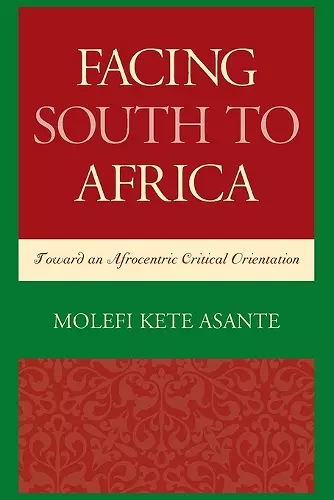Facing South to Africa
Toward an Afrocentric Critical Orientation
Format:Paperback
Publisher:Lexington Books
Published:26th Apr '16
Currently unavailable, and unfortunately no date known when it will be back
This paperback is available in another edition too:
- Hardback£88.00(9780739196717)

Facing South to Africa is a bold synthesis of the ideas that have made Afrocentric theorists the leading voices of the African renaissance. Written from the vantage point of the philosophical and political discourse that emerged over the past twenty-five years, this is a highly readable and accessible introduction to African social and cultural criticism. Molefi Kete Asante engages in the practice of critical thinking by raising fundamental questions about how Africans view themselves and the world. Tackling the themes of culture, education, social sciences, the university, politics, African unity, and the prospects for peace in Africa, Facing South to Africa is a fresh, daring, and popularizing synthesis of the best critical thought on the issues of modern knowledge. Asante’s plan is to reorient our thinking on Africa by asking questions of Africa and Africans rather than imposing preconceived, external ideas on African issues.
Gearing his book primarily to scholars of Afrocentricity theory, Asante, the architect of Afrocentricity, provides perspectives on numerous topics and theories through the Afrocentric lens. He briefly explains Afrocentricity’s position on theories, from structuralism and postmodernism to negritude, Africology, and kawaida (a theory proposed by Maulana Karenga in the 1970s). Asante also looks at immigration, identity, black education, a united Africa, and the various conflicts impacting Africa today. . . . [T]he book...provide[s] important considerations of existing debates, especially around Pan-African unity, and deepens understanding of critical issues for scholars of Afrocentricity. Summing Up: . . . [For] scholars. * CHOICE *
Molefi Kete Asante's brilliant collection of essays has arrived just in time to rescue a generation of African intelligentsia numbed into a Pax-Americana ideology. Asante's critical examination of Eurocentric triumphalism is balanced with Maatic alternatives toward life in general and agency in particular. The book disintegrates contemporary ideological breeds guilty of lulling all and sundry intellectuals into paralyses of analyses. The essays presented deftly expose debilitating notions from the so-called right and left polemicists, while presenting human alternatives to imperialist intrigue. Asante gives the update of the Afrocentric praxis and paradigm that many readers have expected and desired. That update contains an 'up south vantage' and blooms globally with homage to Pan-African agency. -- D. Zizwe Poe, Lincoln University
In what could be considered his magnuMolefi Kete Asante uncovers and assesses new and historical contours of world relationships involving Africa and Europe. He offers a body of knowledge and analytical tools to give new generations of Africans the ability to infuse the contemporary world with standards of ethics and justice that can contemplate diversity and non-hierarchical plurality without sacrificing truth or wisdom. This book is a must for any person sincerely engaged in the effort to build a better world through dialogue and cross-cultural understanding. m opus, Asante delivers with expected clarity, force and illumination. His discussion of African intellectual agency is in perfect alignment with his long standing commitment to the well-being of African descended people worldwide. Once again, Asante rescues the reality of Africa from the clutches of anti-egalitarian historiography and delivers a text quite worthy of the academy’s consideration on every level. -- Michael Tillotson, University of Pittsburgh
Molefi Kete Asante uncovers and assesses new and historical contours of world relationships involving Africa and Europe. He offers a body of knowledge and analytical tools to give new generations of Africans the ability to infuse the contemporary world with standards of ethics and justice that can contemplate diversity and non-hierarchical plurality without sacrificing truth or wisdom. This book is a must for any person sincerely engaged in the effort to build a better world through dialogue and cross-cultural understanding. -- Elisa Larkin Nascimento, IPEAFRO (Instituto de Pesquisas e Estudos Afro-Brasileiros)
ISBN: 9781498501569
Dimensions: 230mm x 151mm x 12mm
Weight: 245g
172 pages